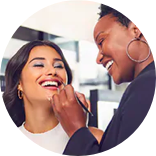Hi, LucyJrz18!
As we age, our body's natural functions can begin to degrade or slow down, which translates to our skin and our health's natural defenses and levels of resiliency aren't as quick acting. This means that damage that our skin may experience may take longer to heal, repair, or improve.
Within your 20s, your skin's defenses and functions should still be at a pretty good state, but of course your actual practices of skin care, lifestyle, dietary means, and even environmental factors can all weigh into skin's current state.
In terms of products that you have used that may burn or cause skin to become blemish prone, can you please share with us what items you experienced this with? While it's not out of the ordinary to have skin react negatively to a product, it can also boil down to things such as usage, aftercare, and how it may interact with other existing products. For example, if you purchased an anti-aging serum that is meant for the face but you applied it to the undereye or surrounding eye area and it resulted in burning or sensitivity, then it may be due to the fact that the item may be too potent for that delicate region and better serves to larger areas versus just around the eyes. The term acne tends to be used very loosely, so when you state that skin becomes reactive, is it perhaps a few blemishes that occur, or do you experience a more constant onslaught of blemishes regardless of what products you're using? For example, if you're testing out a new moisturizer and the next morning you wake with maybe one or two pimples on your skin, which will begin to dissipate rather immediately after ceasing using the moisturizer and direct treatment (which would not be classified as actual acne) or regardless of whether you're trying a new item or not you may experience anywhere from 15+ blemishes a month?
Can you please clarify if by "derma doctor treatment" you mean the actual brand Derma Doctor or if it's an actual prescription treatment or medication that your licensed health care provider or dermatologist has prescribed?
When starting to incorporate anti-aging products, it's important to also keep a level approach. In other words, if the skin around your eyes may not current be experiencing fine lines, crow's feet, or deep wrinkles then there's no need to immediate hark on an eye cream that address those actual concerns. Generally in your 20s, the approach is more of a preventative one, meaning you wish to keep skin in its relatively healthy and good state so that you're able to prevent the early on-coming of issues that may range from crepeiness, dryness, fine lines, bags, and wrinkles.
Basic practices such as proper cleansing will also be a key step in any one's skin care, regardless of age or concern. If one does not have cleansed skin, then that means oils, bacteria, dirt, and pollutants are forming a barrier atop skin and can thus prevent any treatment, moisturizer, or skin care product from better penetrating skin's surface to then absorb and begin to take effect.
From there, moisturizing is another basic step that anyone can benefit from. With combination skin, it's important not to confuse the oil that your skin naturally produces as being "enough" to hydrate skin. Skin needs two basic components to stay moisturized, water and oil. Since our bodies cannot produce water, it turns to oil, and when we deplete our skin of a moisturizer source, it will try to overcompensate for the lack of hydration by overproducing oil. This imbalance can lead to that excess oil clogging pores and contributing to blemishes forming.
In addition to moisturizing, the use of SPF is essentially a non-negotiable factor. Sun protection is so crucial in warding off premature signs of aging as well as protecting skin that may already be damaged from worsening. Think of SPF as that final step in skin care that serves as insurance for your skin. If you're slathering skin in decadent serums, beautiful moisturizers, potent peels, creamy cleansers, and the such, but you're not adding SPF into your daily regimen, those benefits of the items used before can essentially be wasted as that treated skin isn't being adequately protected. No one wants to pour time and money into a skin care regimen to take one step forward, only to not use SPF, which would be like taking two steps back.
With those basics covered, some key ingredients to check into to help support your skin's natural functions and ward off signs of premature damage would be anti-oxidants. If you've ever cut open an apple or an avocado and left it as is, you may begin to notice its flesh beginning to brown and even wither down some. This process is caused oxidation and it's due to the free radicals in the air which are environmental aggressors that essentially attack and damage healthy tissue, causing it to degrade and thus change in texture, color, and quality. AOs help shield and cushion these effects on skin, serving to protect skin. This can be illustrated with how many cooking tips state to squeeze a bit of lemon juice onto apple slices to prevent that browning (lemon juice contains vitamin C; however, this doesn't mean that straight lemon juice should be applied to skin). One of the top anti-oxidants on the market is vitamin C, which also serves to help maintain a more even and radiant skin tone (perfect to combat post-acne marks, age spots, or sun spots/pigmentation damage) while supporting collagen synthesis so skin remains supple and firm.
For more information on SPF and anti-oxiants, plus some eye cream recommendations, check out---
http://community.sephora.com/t5/Antiaging/Prevention-in-your-20-s/m-p/2009455/highlight/true#M2857
With more sensitive skin, try to obtain samples or do test/patch applications to trial a formula to see that it doesn't irritate your skin. If you find that your skin is highly reactive to the majority of products that you've tried, you may even consider scheduling an appointment with an allergist to learn what may be safe for use and what to avoid to make sure you're not having to take as many chances in the future with multiple trial and error sessions to find what works and what doesn't for you.














